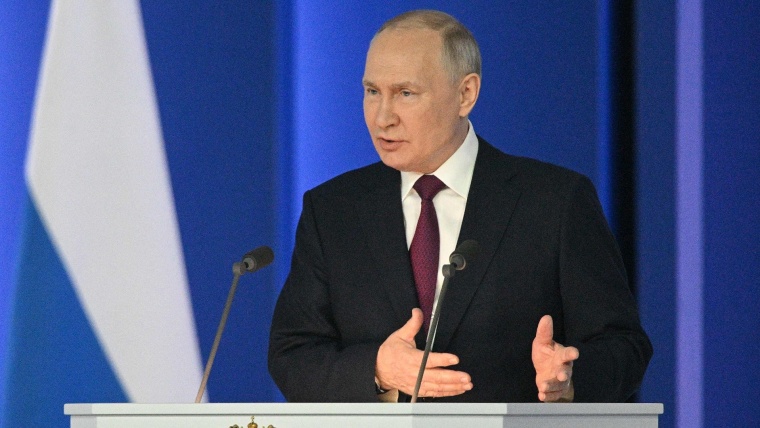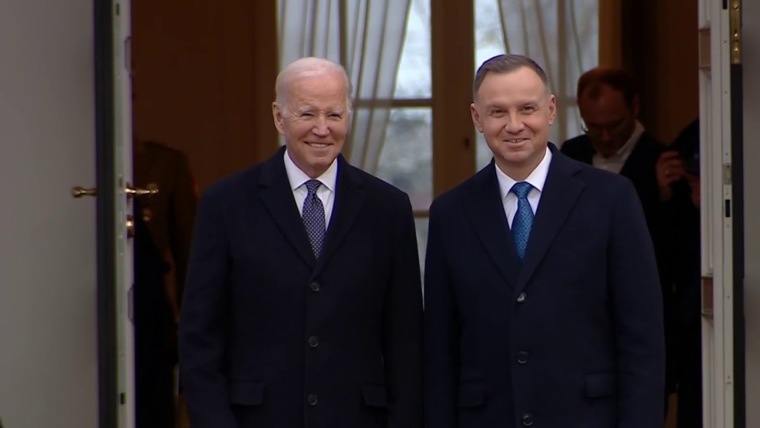[ad_1]
WARSAW, Poland — President Joe Biden framed the war in Ukraine on Tuesday as an existential test for democratic nations which are proving on the battlefield that they will aggressively defend political freedoms in the face of autocracies bent on extinguishing them for good.
Fresh off his surprise visit to Ukraine, Biden delivered a 20-minute speech here Tuesday that carried a sweeping indictment of Russian President Vladimir Putin, who launched the invasion exactly one year ago Friday.
Putin gravely miscalculated in assuming that Ukraine would swiftly crumble and its democratic allies would scatter as Russian forces advanced, the president said. The collapse never happened. As the war enters its second year, Putin has presided over a string of humiliating defeats, Biden added, striking a triumphal note.
“One year ago, the world was bracing for the fall of Kyiv,” Biden told an audience of thousands gathered in 44-degree weather outside the Royal Castle in Warsaw. “Well, I’ve just come from a visit to Kyiv and I can report, Kyiv stands strong. Kyiv stands proud. It stands tall. And most important, it stands free.”
“When President Putin ordered his tanks to roll into Ukraine, he thought we would roll over,” he added. “He was wrong! The Ukrainian people are too brave. America, Europe, a coalition of nations from the Atlantic to the Pacific — we were too unified. Democracy was too strong. Instead of an easy victory he perceived and predicted, Putin left with burned-out tanks and Russian forces in disarray.”
Ahead of the trip, the White House had said that Biden would make only one stop: Warsaw. But that turned out to be a ruse. Under extraordinary secrecy, Biden left the White House a day ahead of schedule, flew to Poland and arrived in Kyiv Monday morning after a 10-hour train ride. That he risked his own safety in visiting a war zone was itself a powerful statement that the administration’s alliance with Ukraine is enduring, analysts said.
“It was a gutsy move, and it demonstrates Biden’s personal commitment to supporting Ukraine,” said Daniel Fried, a former U.S ambassador to Poland. “It’s not the kind of thing a president does if he’s looking to back out of supporting Ukraine. It’s a way of demonstrating the opposite: that we’re in this and we’re in this to succeed.”
What made the visit all the more extraordinary was the comparative lack of security for America’s commander-in-chief. When presidents visit war theaters, they normally go to places under the control of U.S. troops. But no American forces are stationed in Ukraine, leaving Biden more exposed.
If the Ukraine leg was a personal display of solidarity, the Poland visit was Biden’s attempt to explain the war to a skeptical audience back home. Recent NBC News polling shows that people may be tiring of the war effort. Americans are nearly split on whether to send more money and arms to Ukraine, with 49 percent in favor and 47 percent opposed.
In his speech, Biden sought to make the case that more is at stake than Ukraine’s independence.
“President Putin ‘s craven lust for land and power will fail, and the Ukrainian peoples’ love for their country will prevail,” he said. “Democracies of the world will stand guard over our freedom today, tomorrow, and forever. That’s what’s at stake here: Freedom.
Biden treated the speech as one of the most important of his presidency. It went through many drafts before reaching its final form, an administration official said. Biden and his national security adviser, Jake Sullivan, were photographed working on the text as they sat in a train car Monday, riding out of Ukraine and back to Poland.
A running thread was Putin’s culpability as the architect of the invasion. Expanding on a speech given by Vice President Kamala Harris in Germany last week, Biden described a litany of Russian atrocities in carrying out the war. Russian forces and paid mercenaries had committed “crimes against humanity without shame or compunction,” he said. They’ve bombed maternity hospitals and orphanages, spirited children out of the country and “used rape as a weapon” in trying to subdue Ukraine, he said.
Biden directly addressed Putin’s claim that the West instigated the war. Hours before Biden spoke, Putin gave a speech of his own. He blamed the West for provoking the war, though he did not mention Biden by name. “They started the war and we are using force to stop it,” Putin said. He called for Russia to suspend participation in the New START Treaty, the nuclear weapons agreement between the two nations.
Biden reiterated a point that the White House has been making for months: If Russia stops fighting, the war will end; if Ukraine stops fighting, it will vanish as a sovereign country.
The American president made a direct appeal to the Russian people, countering Putin’s insistent claims that the West is to blame for the conflict.
“The West was not plotting to attack Russia, as Putin said today,” Biden said.
“President Putin chose this war,” he added. “Every day the war continues is his choice. He could end the war with a word.
During a conference call previewing the speech, Sullivan told reporters: “You will hear in this speech vintage Joe Biden. The president has believed passionately in the themes he will discuss tonight for decades.”
For all the attention paid to Biden’s foray into Ukraine, the speech could prove historic as the world confronts a 21st century iteration of the Cold War.
Biden caused an uproar last year when he spoke in Poland and ad-libbed a line that suggested he wanted to see Putin deposed: “For God’s sake, this man cannot remain in power,” he said.
The White House quickly walked back the comment, saying regime change in Russia was not Biden’s goal.
This time, Biden hewed closely to the final text. There were no apparent gaffes or improvisations on his part.
“The president understands that this is a singular moment and he’s going to take advantage of it,” one administration official said, speaking on condition of anonymity to talk more freely.
Whether the speech will sway Americans and rally public support for the war is another question. For many, the war is a distant drama, far removed from their concerns about the rising cost of living.
“Part of this speech is to an American audience,” Fried, the former ambassador, said. “Why do we care? We care about Ukraine for the same reason we cared about Europe during World War II. We don’t want dictators rampaging around.”
[ad_2]
Source link


